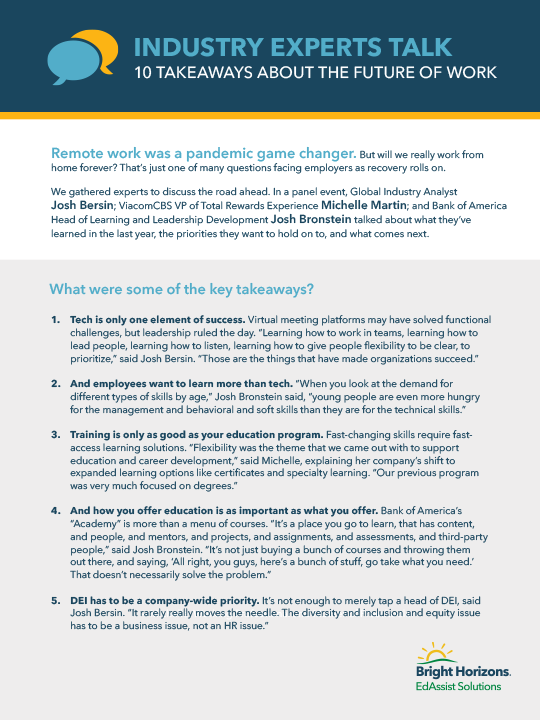What’s it like to work in healthcare right now?
We all know the stories of heroic doctors and nurses on the frontlines.
But behind the scenes since March there’s been a different kind of triage; the kind required to preserve the hospital itself.
“The pandemic put enormous pressure on organizations and their employees,” Bright Horizons VP of Healthcare Doug Stefano told those participating in our recent panel on the future of healthcare. “Organizations have had to adapt.”
Each of our panelists – Mayo Clinic CHRO Cathy Fraser, Memorial Hermann Health System VP of Organizational Development & Learning Kelly Oliphant, and Gerard Camacho, AVP of Learning and Career Development at Atrium Health – conceded the earliest days were spent in crisis mode.
But they all agreed the lessons learned will be instrumental in the future of healthcare.
What have those lessons been?
Support resilience: Rapid-fire changes on multiple fronts challenged healthcare to move faster than their typical decision-making processes and committee would have allowed. In the future, organizations should look to small but meaningful steps over long-view wholesale change. “I say, if it’s forward motion,” said Cathy, “if it gets us a little bit closer to tomorrow, I’m much more willing to do that than work for the perfect answer…it’s the resilient champions and warriors that are going to take this one forward.”
Be ready to pivot: Responding to a previously unknown virus required shifting people from existing roles into brand new proficiencies – and in a hurry. Gerard said it was a perfect moment to take stock of education and workforce development and ask the question, “How do we work with community colleges and other partners to create rapid certification training?”
Support personal lives: How a culture performs in tough times speaks volumes to employees later on. It’s why Memorial Hermann stayed tuned in to employees’ personal issues around child care, learning at home, tutoring, elder care, and more. “We’ve looked at this is an opportunity,” said Kelly, “where your culture and your values can really shine.”
Act (really act) on racial equity: George Floyd’s murder brought racism screaming to the forefront; it also created a sense of urgency to take meaningful action. D&I may be organization wide, but panelists felt answers will be local – in how providers hire, recruit, and develop from the community. The Mayo Clinic, for example, is not only funding local efforts, but setting expectations for local plans for equity, representation, and inclusion.
Focus on mental health: The emotional challenges of the pandemic reaffirmed the need for more than just physical support. “We’ve done a lot to help our organization become aware of the resources that are available to them,” said Kelly, “as well as taking meaningful action to support one another.”
The above are the broad strokes – lessons learned from nearly six months unlike any other. Yet despite the continuing crisis, each of our panelists agreed there’s opportunity to change healthcare for the better. “This has demonstrated that we can do it,” said Cathy, “that we can move fast; we can be innovative, we can try things.
“I think my biggest fear is we don’t take this momentum and run with it,” she said.
“I’m totally jazzed about the future.”
Executive Panel: The Healthcare Talent Imperative
Access the replay to hear insights from healthcare HR executives on how they are approaching this deeply challenging moment, and what they see ahead.






